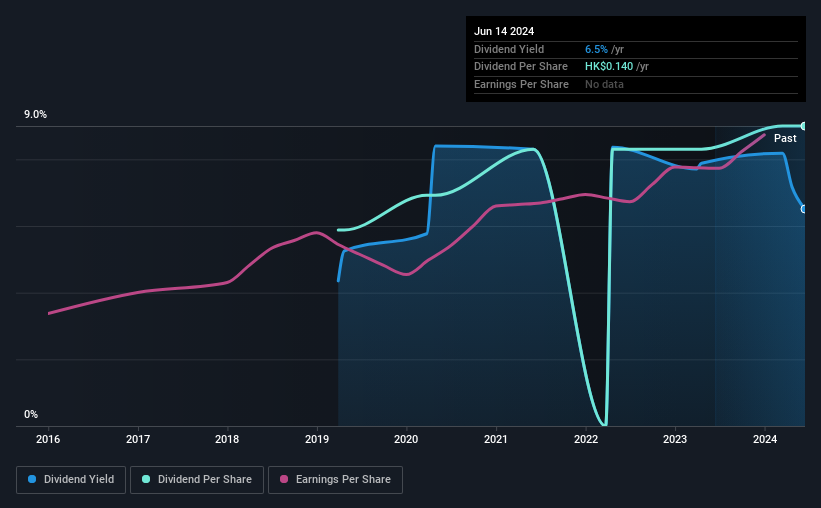- Hong Kong
- /
- Electric Utilities
- /
- SEHK:1713
Sichuan Energy Investment Development (HKG:1713) Has Announced That It Will Be Increasing Its Dividend To CN¥0.1433
Sichuan Energy Investment Development Co., Ltd. (HKG:1713) will increase its dividend from last year's comparable payment on the 25th of July to CN¥0.1433. This takes the annual payment to 6.5% of the current stock price, which is about average for the industry.
View our latest analysis for Sichuan Energy Investment Development
Sichuan Energy Investment Development's Dividend Is Well Covered By Earnings
We aren't too impressed by dividend yields unless they can be sustained over time. Before making this announcement, Sichuan Energy Investment Development was earning enough to cover the dividend, but it wasn't generating any free cash flows. In general, we consider cash flow to be more important than earnings, so we would be cautious about relying on the sustainability of this dividend.
If the trend of the last few years continues, EPS will grow by 8.5% over the next 12 months. If the dividend continues on this path, the payout ratio could be 45% by next year, which we think can be pretty sustainable going forward.

Sichuan Energy Investment Development's Dividend Has Lacked Consistency
Sichuan Energy Investment Development has been paying dividends for a while, but the track record isn't stellar. This suggests that the dividend might not be the most reliable. Since 2019, the annual payment back then was CN¥0.085, compared to the most recent full-year payment of CN¥0.13. This works out to be a compound annual growth rate (CAGR) of approximately 8.9% a year over that time. A reasonable rate of dividend growth is good to see, but we're wary that the dividend history is not as solid as we'd like, having been cut at least once.
Sichuan Energy Investment Development Could Grow Its Dividend
Growing earnings per share could be a mitigating factor when considering the past fluctuations in the dividend. Sichuan Energy Investment Development has seen EPS rising for the last five years, at 8.5% per annum. While on an earnings basis, this company looks appealing as an income stock, the cash payout ratio still makes us cautious.
In Summary
Overall, we always like to see the dividend being raised, but we don't think Sichuan Energy Investment Development will make a great income stock. With cash flows lacking, it is difficult to see how the company can sustain a dividend payment. This company is not in the top tier of income providing stocks.
Investors generally tend to favour companies with a consistent, stable dividend policy as opposed to those operating an irregular one. Meanwhile, despite the importance of dividend payments, they are not the only factors our readers should know when assessing a company. For example, we've identified 2 warning signs for Sichuan Energy Investment Development (1 is a bit unpleasant!) that you should be aware of before investing. If you are a dividend investor, you might also want to look at our curated list of high yield dividend stocks.
New: Manage All Your Stock Portfolios in One Place
We've created the ultimate portfolio companion for stock investors, and it's free.
• Connect an unlimited number of Portfolios and see your total in one currency
• Be alerted to new Warning Signs or Risks via email or mobile
• Track the Fair Value of your stocks
Have feedback on this article? Concerned about the content? Get in touch with us directly. Alternatively, email editorial-team (at) simplywallst.com.
This article by Simply Wall St is general in nature. We provide commentary based on historical data and analyst forecasts only using an unbiased methodology and our articles are not intended to be financial advice. It does not constitute a recommendation to buy or sell any stock, and does not take account of your objectives, or your financial situation. We aim to bring you long-term focused analysis driven by fundamental data. Note that our analysis may not factor in the latest price-sensitive company announcements or qualitative material. Simply Wall St has no position in any stocks mentioned.
Have feedback on this article? Concerned about the content? Get in touch with us directly. Alternatively, email editorial-team@simplywallst.com
About SEHK:1713
Sichuan Energy Investment Development
A vertically integrated power supplier and service provider primarily in Mainland China.
Good value with proven track record.
Market Insights
Community Narratives


Recently Updated Narratives


MINISO's fair value is projected at 26.69 with an anticipated PE ratio shift of 20x


The Quiet Giant That Became AI’s Power Grid


Nova Ljubljanska Banka d.d will expect a 11.2% revenue boost driving future growth
Popular Narratives


The company that turned a verb into a global necessity and basically runs the modern internet, digital ads, smartphones, maps, and AI.


MicroVision will explode future revenue by 380.37% with a vision towards success



